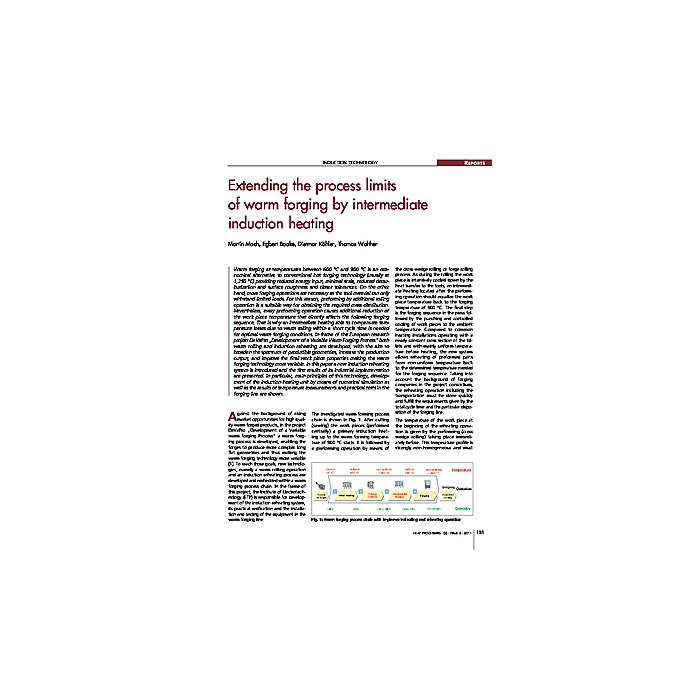Extending the process limits of warm forging by intermediate induction heating
4,90 €
Auf Lager
Artikelnummer
00541_2011_02_03
Warm forging at temperatures between 600 °C and 900 °C is an economical alternative to conventional hot forging technology (usually at 1,250 °C) providing reduced energy input, minimal scale, reduced decarburization and surface roughness and closer tolerances. On the other hand, more forging operations are necessary as the tool material can only withstand limited loads. For this reason, preforming by additional rolling operation is a suitable way for obtaining the required mass distribution. Nevertheless, every preforming operation causes additional reduction of the work piece temperature that directly affects the following forging sequence. That is why an intermediate heating able to compensate temperature losses due to warm rolling within a short cycle time is needed for optimal warm forging conditions. In frame of the European research project DeVaPro "Development of a Variable Warm Forging Process" both warm rolling and induction reheating are developed, with the aim to broaden the spectrum of producible geometries, increase the production output, and improve the final work piece properties making the warm forging technology more variable. In this paper a new induction reheating system is introduced and the first results of its industrial implementation are presented. In particular, main principles of this technology, development of the induction heating unit by means of numerical simulation as well as the results of temperature measurements and practical tests in the forging line are shown.
| Autoren | Martin Mach/Egbert Baake, Dietmar Köhler, Thomas Walther |
|---|---|
| Erscheinungsdatum | 01.02.2011 |
| Format | |
| Zeitschrift | heat processing - Issue 02 2011 |
| Verlag | Vulkan-Verlag GmbH |
| Sprache | English |
| Seitenzahl | 6 |
| Titel | Extending the process limits of warm forging by intermediate induction heating |
| Beschreibung | Warm forging at temperatures between 600 °C and 900 °C is an economical alternative to conventional hot forging technology (usually at 1,250 °C) providing reduced energy input, minimal scale, reduced decarburization and surface roughness and closer tolerances. On the other hand, more forging operations are necessary as the tool material can only withstand limited loads. For this reason, preforming by additional rolling operation is a suitable way for obtaining the required mass distribution. Nevertheless, every preforming operation causes additional reduction of the work piece temperature that directly affects the following forging sequence. That is why an intermediate heating able to compensate temperature losses due to warm rolling within a short cycle time is needed for optimal warm forging conditions. In frame of the European research project DeVaPro "Development of a Variable Warm Forging Process" both warm rolling and induction reheating are developed, with the aim to broaden the spectrum of producible geometries, increase the production output, and improve the final work piece properties making the warm forging technology more variable. In this paper a new induction reheating system is introduced and the first results of its industrial implementation are presented. In particular, main principles of this technology, development of the induction heating unit by means of numerical simulation as well as the results of temperature measurements and practical tests in the forging line are shown. |
Eigene Bewertung schreiben


